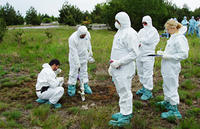-
The Israel-Hamas prisoner exchange
If everything goes according to plan, then this coming Tuesday will see Gilad Shalit, the Israeli soldier kidnapped by Hamas operatives more than five years ago and held incommunicado since – even the Red Cross was not allowed to visit him — return to Israel in exchange for 1,027 Palestinian prisoners held in Israeli jails (1,000 men and twenty-seven women); the deal was reached after both Israel and Hamas agreed to major compromises; analysts say that one of the main reasons prompting Israel to show more flexibility was the desire to “clean the table” of troublesome and divisive issues in preparation for a possible Israeli military attack on Iran’s nuclear facilities
-
-
Little progress despite $3.4 billion spent on food safety programs

In the past decade the U.S. government has gone to great lengths to secure the nation’s food supply against terrorists, but more than $3.4 billion later it has little to show for its efforts; despite all the government spending, key food safety programs and counter-terror policies have been bogged down by a murky, convoluted bureaucratic process
-
-
Iranian airline sanctioned for ties to terrorism
On Wednesday the U.S. Treasury Department imposed sanctions on sanctioned Mahan Air, an Iranian airline, for supporting terrorism
-
-
Sony hit by hackers again, 93,000 accounts compromised
Once again Sony has been the victim of a major cyberattack. This time as many as 93,000 accounts have been compromised from Sony Entertainment Network, PlayStation Network, and Sony Online Entertainment
-
-
U.S. unprepared for large-scale bio-attack, report warns

On Wednesday, the WMD Center released its latest report that found the United States is unprepared for a large-scale biological attack, despite spending more than $65 billion on biodefense over the past decade; the report warned that the threat of biological weapons is now greater than ever as a result of technological advances; a small team of individuals with training in key disciplines can produce “the type of bioweapons created by nation-states in the 1960s”
-
-
Major breakthroughs in facial recognition, cause for concern?

Technological advances could soon make identifying an individual in a crowd as simple as taking a photo with a smartphone; researchers at Carnegie Mellon University’s Heinz College have developed PittPatt, a software tool that can take a snapshot of a person and track down their real identity in a matter of minutes
-
-
Michigan to launch cyber command center and defense teams
To help boost the state’s economy and its role in securing the nation’s data networks, Michigan recently announced that it plans to launch a cyber command center and cyber defense response teams
-
-
U.S.: Iranian agents tried to kill Saudi ambassador to U.S.

The U.S. attorney general Eric Holde rannounced yesterday that the U.S. government has foiled an Iranian plot to assassinate the Saudi ambassador to the United States; Iran wired $100,000 into a U.S. bank account in August as a down payment for the hit; the assassins — the Iranians thought they were members of a Mexican drug cartel — were to receive $1.5 million if the hit was successful
-
-
Calif. Allows warrantless searches of cell phones

California Governor Jerry Brown has vetoed a bill which aimed to prohibit California police from conducting warrantless searches of the cell phones of people under arrest
-
-
Concordia Summit: sustaining "at risk" communities long-term
The high-level Concordia Summit, which gathered heads of state, business leaders, government officials, and counter-terrorism experts to find solutions focusing on public-private partnerships, announces its key findings
-
-
Environmentalists in arms over border decision
Yesterday, House Natural Resources Committee 26-17 vote to approve H.R. 1505, the National Security and Federal Lands Protection Act; the proposed legislation would waive thirty-six environmental and other laws for U.S. Customs and Border Patrol activities on public lands within 100 miles of U.S. borders; environmentalists are angry
-
-
U.S.-Canada reach border agreement
The U.S.-Canada border security pact reached earlier this year by President Obama and Prime Minister Stephen Harper is nearing completion
-
-
N.Y. businesses protest DHS budget cuts
On Monday more than 100 New York City business executives urged lawmakers to maintain current DHS spending levels to prevent a future terrorist attack in the city; their business people move comes in response to the latest proposed budget for DHS by the House which looks to cut more than $1 billion, or 2.6 percent, of the agency’s budget; meanwhile the Senate has proposed cutting more than $650 million from DHS’ 2011 budget of $41 billion
-
-
GAO: poor security procedures put sensitive government data at risk
A recently released Government Accountability Office (GAO) report found that poor information security practices at U.S. government agencies have put sensitive data and servers at risk
-
-
Tallahassee airport upgrades security
ADT Commercial was selected by the City of Tallahassee, Florida to upgrade the security at the city airport — and integrate the different security solutions; the integrated system includes video surveillance, access control, and emergency notification systems
-